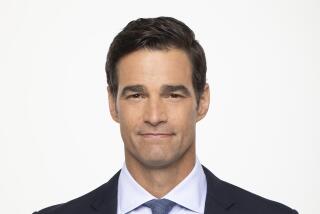Disney may join online rivals
Walt Disney Co., signaling a dramatic shift in its Internet strategy, is negotiating with longtime media rivals to take an equity stake in Hulu.com, the fast-growing website where users can watch movies and TV episodes for free.
In exchange, Disney would provide episodes of ABC shows to Hulu, significantly broadening the program offerings to include such hits as “Grey’s Anatomy” and “Desperate Housewives.”
The discussions, which heated up in recent weeks, represent an evolution of ABC’s Web strategy, which had focused on drawing viewers to the network’s own site. Disney appears to have decided that the power of the ABC and Disney names is not strong enough for the company to compete and that it needs broader distribution for its shows.
Disney’s willingness to join Hulu also validates the success of the joint venture created two years ago by rivals News Corp. and NBC Universal. The website, along with its quirky name, was initially greeted with skepticism as observers questioned whether the two media giants, longtime competitors, could create an online destination for professional content.
“This is an acknowledgment of Hulu’s rapid growth and its ability to sustain a very large audience,” said Michael McGuire, media analyst with Gartner Inc.
Disney, he said, has “got to go where the people are.”
Hulu’s audience has exploded. The site attracted 34.7 million viewers in February -- slightly more people than those watching an episode of Fox’s hit show “American Idol,” according to ComScore Video Metrix, which tracks online traffic. Still, that’s about a quarter of the more than 145 million U.S. Internet users. The number of Hulu video viewers jumped 42% in February, according to ComScore. But the audience for the site is still dwarfed by Google Inc.’s popular YouTube.com.
“We’re seeing a confirmation of a very important new power center,” McGuire said. “Hulu has turned into much more than what a lot of people thought it would.”
Disney made a bet three years ago that the strength of its ABC and Disney brands would be enough to attract online viewers, and so it chose not to participate in Hulu during its launch. ABC shows, including “Lost” and “Desperate Housewives,” have generated plenty of viewers on ABC.com, but it now trails other network sites, including Hulu and CBS, according to ComScore.
People within the company say the change in direction was mandated by Chief Executive Bob Iger, who has championed Disney’s push into the digital media future with a deal to offer downloads of TV shows through Apple Inc.’s iTunes. Executives said Iger had been calling for another big move.
Disney would receive a stake in the joint venture on par with Fox and NBC -- likely 30% for each network. That would preserve Providence Equity Partners’ 10% holding, which it received in exchange for an early $100-million investment. It’s probable that the venture will need additional funding before it turns a profit, but the addition of Disney’s content may well help it achieve a tipping point.
Another network also has been courting Disney: CBS, which owns TV.com, a Hulu rival. This underscores the popularity of ABC’s shows online, which Nielsen VideoCensus reports included nine of the top 10 most viewed in February.
But despite its considerable traction, Hulu has created thorny issues for media companies that are partners in the site. So far, TV shows available online with a few commercials generate substantially less money than the longtime Hollywood model of making shows for broadcast networks and cable channels. The big profits were traditionally made after shows were on the air four seasons, accumulating enough episodes to sell reruns to local stations and cable.
For now, media companies, including Disney, are betting that they will eventually figure out a way to squeeze sufficient dollars from the Internet to pay the costs of producing shows. But that’s probably several years away.
A more immediate concern is how Hulu is complicating longtime partnerships. The on-demand element of Hulu -- with clicks of the mouse, viewers can watch episodes of programs any time they want -- threatens to erode the value of established broadcast and cable channels.
Hulu Chief Executive Jason Kilar said in an interview this month that his company, though “relentlessly obsessive” about meeting viewer demands, needed to keep its partners and advertisers happy. Sometimes, that entails holding back a popular show so that the networks can make money on other platforms -- like traditional TV.
--
meg.james@latimes.com
More to Read
The biggest entertainment stories
Get our big stories about Hollywood, film, television, music, arts, culture and more right in your inbox as soon as they publish.
You may occasionally receive promotional content from the Los Angeles Times.







